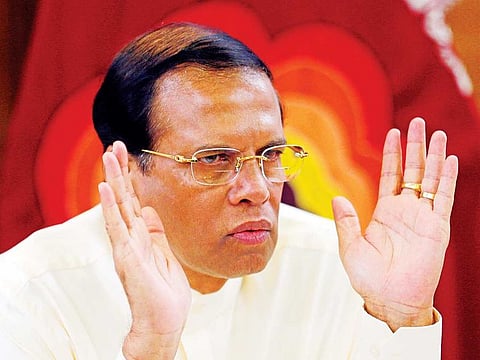Sri Lanka MPs defy president
Parliamentary Select Committee begins hearing testimony from Muslim leaders

Colombo: Sri Lanka’s parliament on Tuesday defied President Maithripala Sirisena and resumed an investigation into security lapses surrounding the Easter suicide bombings that killed 258 people, officials said.
The Parliamentary Select Committee (PSC) began hearing testimony from Muslim leaders who claimed they repeatedly alerted the authorities to dangerous radicalisation, a parliamentary official said.
President Sirisena last week asked his coalition cabinet to halt the hearings, which have already revealed senior police and security officials directly under him had ignored repeated intelligence warnings.
Sirisena sacked his intelligence chief over the weekend after he told the hearing that the April 21 attacks could have been avoided if police had been allowed to arrest the ringleader as early as last year.
A Daesh-inspired local militant group has been blamed for the suicide attacks against three churches and three luxury hotels. Among the dead were 45 foreign nationals, while nearly 500 people were injured.
Since the attacks, the country has been under a state of emergency which gives sweeping powers to the police and security forces to arrest and detain suspects for long periods of time.
Sirisena has insisted that as minister of defence and law and order he was unaware of precise intelligence warnings from India.
He sacked his defence ministry secretary, Hemasiri Fernando, and suspended police chief Pujith Jayasundara after blaming them for the catastrophic security failure.
Both have denied responsibility.
Sirisena said he will not allow public servants to testify before the hearing, but parliament warned on Sunday that any official refusing its summons could face up to 10 years in jail.
It was not immediately clear if the PSC had asked any official to testify since Sirisena’s remarks on Friday.
The president also ordered live broadcasts of the PSC proceedings to be halted.
New Delhi said it shared detailed information about the Sri Lanka attack with Colombo as early as April 4 — two-and-a-half weeks before the bombings — following information gleaned from a militant in Indian custody.



